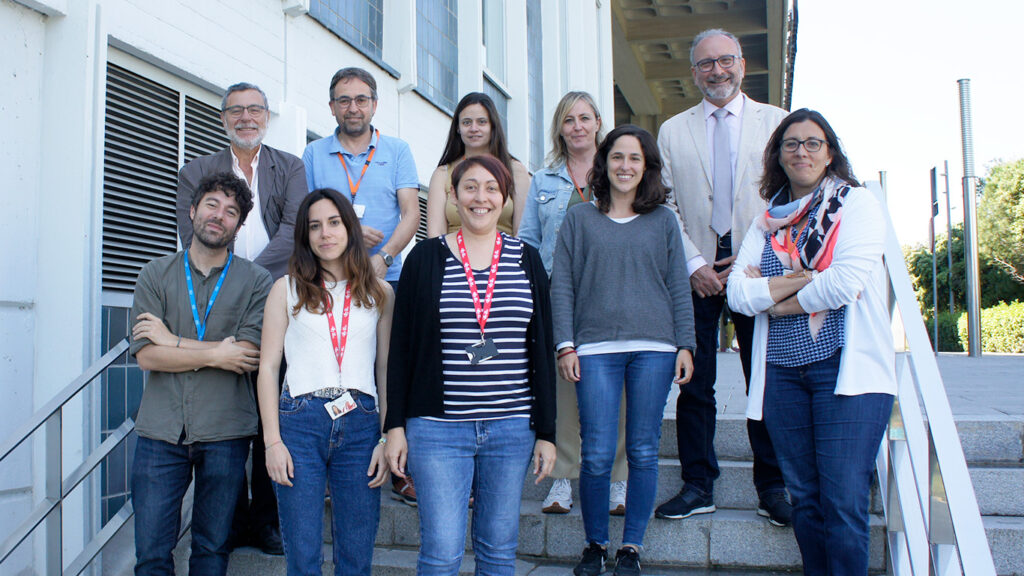Researchers present a new method that can detect small changes in the DNA sequence -in the regions called microsatellites- that could predict the endometrial cancer development in women affected by Lynch syndrome, a hereditary disease of cancer predisposition. This technique, tested in a pilot study with 93 women published in the Modern Pathology journal, combines massive sequencing of genetic material and subsequent bioinformatic analysis and would be applied to endometrial aspirate samples.
Lynch syndrome affects approximately 1 in 300 people. They have a hereditary mutation that predisposes them to gastrointestinal and/or endometrial cancer, mainly. Between 13 and 49% of women with Lynch syndrome, depending on the affected gene, will develop endometrial cancer. To avoid possible cancer development, clinicians offer the possibility to perform a total hysterectomy -complete uterus removal- at 40 years old. However, not all women will develop cancer, and not all will do it after 40 years-old.
This new method aims to implement a more individualized follow-up system for women with Lynch syndrome. Dr. Joan Brunet, a principal investigator of the Bellvitge Biomedical Research Institute (IDIBELL) and the Girona Biomedical Research Institute (IDIBGI) and head of the Genetic Counseling Units of the Catalan Institute of Oncology (ICO) centers, declares that “the ultimate goal is to prevent unnecessary hysterectomies, detect when cancer is about to develop to act on time and only when necessary.”
This study required the collaboration of geneticists, oncologists, bioinformaticians, epidemiologists, gynecologists, and pathologists from IDIBELL, ICO, IDIBGI, the Bellvitge University Hospital (HUB), and the Josep Trueta University Hospital. “To apply the laboratory advances to improve patients’ health and life quality, the experience of professionals from many disciplines is necessary. This study is a clear example of how to create synergies for the benefit of patients”, says Dr. Xavier Matias Guiu, head of the IDIBELL gynecological cancer research group and Head of the HUB’s Pathological Anatomy Service.
DNA microsatellite instability to predict endometrial cancer
Patients with Lynch syndrome have mutations in genes that prevent the correct repair of DNA errors. This causes error accumulation, especially in repetitive regions called microsatellites. This accumulation of errors is called microsatellite instability.
Dr. Marta Pineda, a researcher at the IDIBELL and ICO hereditary cancer group, highlights that the ultrasensitive computer analysis developed by her research group can detect small variations in the microsatellite size in endometrial aspirate cells even before cancer develops.
Easily applicable to clinical practice
According to Dr. Jordi Ponce, IDIBELL researcher and head of the HUB’s gynecology service, this would be a technique easily applicable to routine clinical practice. On the one hand, massive DNA sequencing is already routinely performed in other disorders diagnosis, and the bioinformatics algorithm for microsatellite instability detection would be easily transferable.
The pilot test has demonstrated the new method potencial in the 93 women with Lynch syndrome recruited by the Screenwide project, led by Dr. Laura Costas, an IDIBELL and ICO researcher.
The researcher’s team is already starting a national multicenter study to validate test clinical utility in a larger patients cohort. In this study, they also consider performing the microsatellite instability analysis in minimally invasive tests such as cytology or vaginal self-sample and thus avoid the discomfort associated with an endometrial aspirate.
The charitable contributions of the BufaLynch and Fundació Roses Contra el Cáncer associations have helped to carry out the study. The new study that is now being launched will also have a grant from the Curs de les Dones de Castelló Empúries. The work has also received funding from the Ministry of Economy and Competitiveness, the Ministry of Science and Innovation, the Carlos III Health Institute, the European regional development fund, CIBERESP, CIBERONC, the SEOM Foundation and the Department of Business and Knowledge of the Government of Catalonia.
The Bellvitge Biomedical Research Institute (IDIBELL) is a biomedical research center created in 2004. It is participated by the Bellvitge University Hospital and the Viladecans Hospital of the Catalan Institute of Health, the Catalan Institute of Oncology, the University of Barcelona and the City Council of L’Hospitalet de Llobregat.
IDIBELL is a member of the Campus of International Excellence of the University of Barcelona HUBc and is part of the CERCA institution of the Generalitat de Catalunya. In 2009 it became one of the first five Spanish research centers accredited as a health research institute by the Carlos III Health Institute. In addition, it is part of the “HR Excellence in Research” program of the European Union and is a member of EATRIS and REGIC. Since 2018, IDIBELL has been an Accredited Center of the AECC Scientific Foundation (FCAECC).

